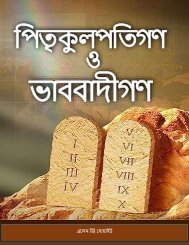Finishing the Race
Of all the games instituted among the Greeks and the Romans, the races were the most ancient and the most highly esteemed … The contests were governed by strict regulations, from which there was no appeal. Those who desired their names entered as competitors for the prize had first to undergo a severe preparatory training. Harmful indulgence of appetite, or any other gratification that would lower mental or physical vigour, was strictly forbidden. For one to have any hope of success in these trials of strength and speed, the muscles must be strong and supple, and the nerves well under control. Every movement must be certain, every step swift and unswerving; the physical powers must reach the highest mark.
Of all the games instituted among the Greeks and the Romans, the races were the most ancient and the most highly esteemed … The contests were governed by strict regulations, from which there was no appeal. Those who desired their names entered as competitors for the prize had first to undergo a severe preparatory training. Harmful indulgence of appetite, or any other gratification that would lower mental or physical vigour, was strictly forbidden. For one to have any hope of success in these trials of strength and speed, the muscles must be strong and supple, and the nerves well under control. Every movement must be certain, every step swift and unswerving; the physical powers must reach the highest mark.
Create successful ePaper yourself
Turn your PDF publications into a flip-book with our unique Google optimized e-Paper software.
extend it. These men went everywhere, teaching in <strong>the</strong> market places, in <strong>the</strong> streets of <strong>the</strong><br />
great cities, and in <strong>the</strong> country lanes. They sought out <strong>the</strong> aged, <strong>the</strong> sick, and <strong>the</strong> poor, and<br />
opened to <strong>the</strong>m <strong>the</strong> glad tidings of <strong>the</strong> grace of God. As a professor of <strong>the</strong>ology at Oxford,<br />
Wycliffe preached <strong>the</strong> word of God in <strong>the</strong> halls of <strong>the</strong> university. So faithfully did he present<br />
<strong>the</strong> truth to <strong>the</strong> students under his instruction, that he received <strong>the</strong> title of "<strong>the</strong> gospel<br />
doctor." But <strong>the</strong> greatest work of his life was to be <strong>the</strong> translation of <strong>the</strong> Scriptures into <strong>the</strong><br />
English language. In a work, On <strong>the</strong> Truth and Meaning of Scripture, he expressed his<br />
intention to translate <strong>the</strong> Bible, so that every man in England might read, in <strong>the</strong> language in<br />
which he was born, <strong>the</strong> wonderful works of God.<br />
But suddenly his labours were stopped. Though not yet sixty years of age, unceasing toil,<br />
study, and <strong>the</strong> assaults of his enemies had told upon his strength and made him prematurely<br />
old. He was attacked by a dangerous illness. The tidings brought great joy to <strong>the</strong> friars. Now<br />
<strong>the</strong>y thought he would bitterly repent <strong>the</strong> evil he had done <strong>the</strong> church, and <strong>the</strong>y hurried to his<br />
chamber to listen to his confession. Representatives from <strong>the</strong> four religious orders, with four<br />
civil officers, ga<strong>the</strong>red about <strong>the</strong> supposed dying man. "You have death on your lips," <strong>the</strong>y<br />
said; "be touched by your faults, and retract in our presence all that you have said to our<br />
injury." The Reformer listened in silence; <strong>the</strong>n he bade his attendant raise him in his bed,<br />
and, gazing steadily upon <strong>the</strong>m as <strong>the</strong>y stood waiting for his recantation, he said, in <strong>the</strong> firm,<br />
strong voice which had so often caused <strong>the</strong>m to tremble: "I shall not die, but live; and again<br />
declare <strong>the</strong> evil deeds of <strong>the</strong> friars."--D'Aubigne, b. 17, ch. 7. Astonished and abashed, <strong>the</strong><br />
monks hurried from <strong>the</strong> room.<br />
Wycliffe's words were fulfilled. He lived to place in <strong>the</strong> hands of his countrymen <strong>the</strong><br />
most powerful of all weapons against Rome--to give <strong>the</strong>m <strong>the</strong> Bible, <strong>the</strong> Heaven-appointed<br />
agent to liberate, enlighten, and evangelise <strong>the</strong> people. There were many and great obstacles<br />
to surmount in <strong>the</strong> accomplishment of this work. Wycliffe was weighed down with<br />
infirmities; he knew that only a few years for labour remained for him; he saw <strong>the</strong><br />
opposition which he must meet; but, encouraged by <strong>the</strong> promises of God's word, he went<br />
forward nothing daunted. In <strong>the</strong> full vigour of his intellectual powers, rich in experience, he<br />
had been preserved and prepared by God's special providence for this, <strong>the</strong> greatest of his<br />
labours. While all Christendom was filled with tumult, <strong>the</strong> Reformer in his rectory at<br />
Lutterworth, unheeding <strong>the</strong> storm that raged without, applied himself to his chosen task.<br />
At last <strong>the</strong> work was completed--<strong>the</strong> first English translation of <strong>the</strong> Bible ever made. The<br />
word of God was opened to England. The Reformer feared not now <strong>the</strong> prison or <strong>the</strong> stake.<br />
He had placed in <strong>the</strong> hands of <strong>the</strong> English people a light which should never be<br />
extinguished. In giving <strong>the</strong> Bible to his countrymen, he had done more to break <strong>the</strong> fetters of<br />
ignorance and vice, more to liberate and elevate his country, than was ever achieved by <strong>the</strong><br />
most brilliant victories on fields of battle. The art of printing being still unknown, it was<br />
only by slow and wearisome labour that copies of <strong>the</strong> Bible could be multiplied. So great<br />
was <strong>the</strong> interest to obtain <strong>the</strong> book, that many willingly engaged in <strong>the</strong> work of transcribing<br />
50


















